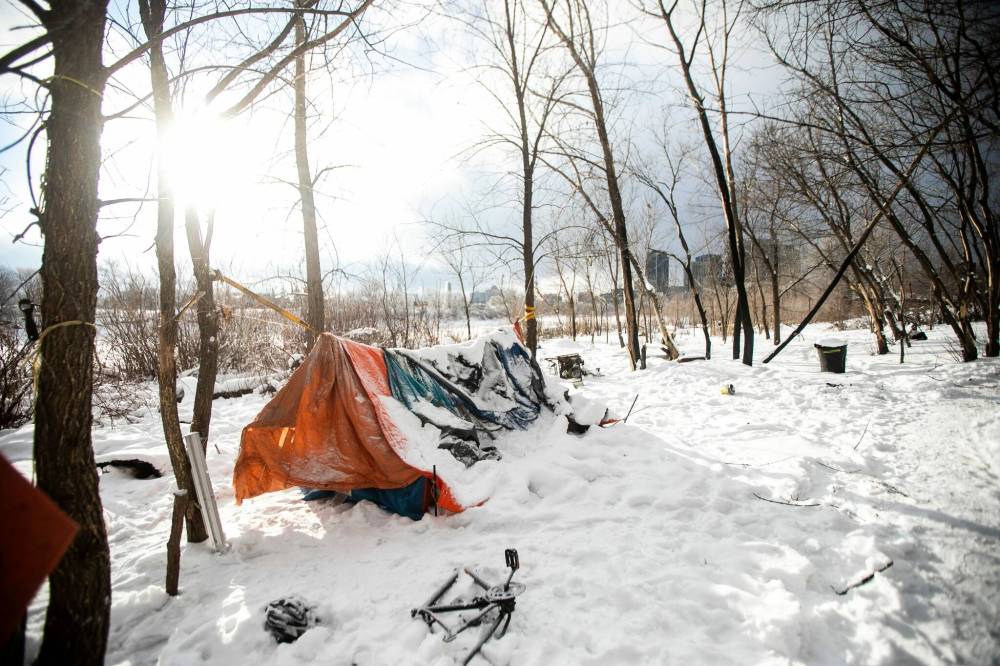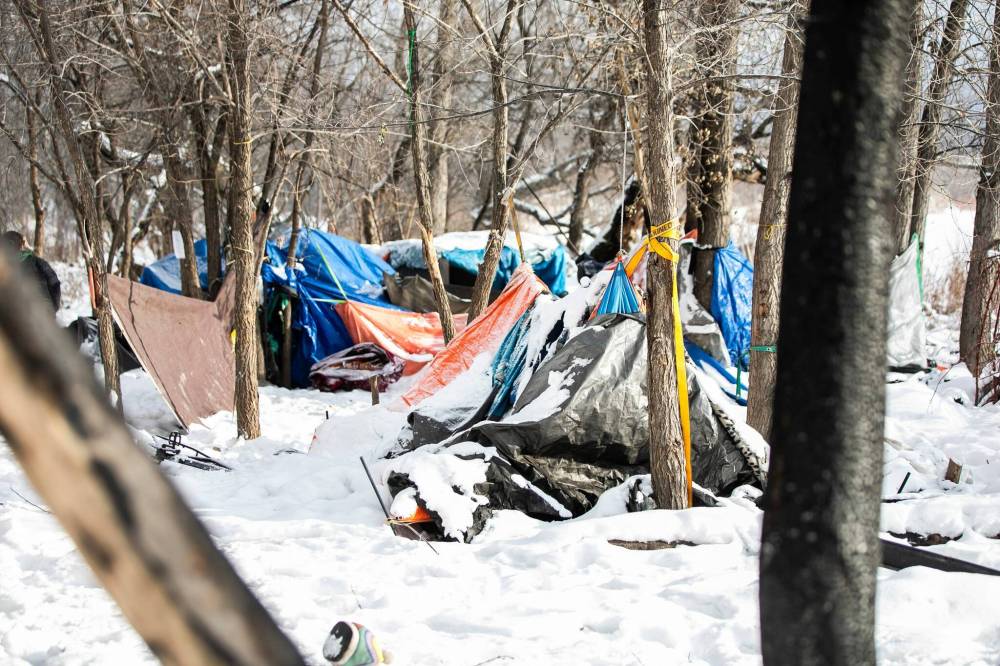Province offers few details on plan to move people from encampment tents to homes
Read this article for free:
or
Already have an account? Log in here »
To continue reading, please subscribe:
Monthly Digital Subscription
$0 for the first 4 weeks*
- Enjoy unlimited reading on winnipegfreepress.com
- Read the E-Edition, our digital replica newspaper
- Access News Break, our award-winning app
- Play interactive puzzles
*No charge for 4 weeks then price increases to the regular rate of $19.00 plus GST every four weeks. Offer available to new and qualified returning subscribers only. Cancel any time.
Monthly Digital Subscription
$4.75/week*
- Enjoy unlimited reading on winnipegfreepress.com
- Read the E-Edition, our digital replica newspaper
- Access News Break, our award-winning app
- Play interactive puzzles
*Billed as $19 plus GST every four weeks. Cancel any time.
To continue reading, please subscribe:
Add Free Press access to your Brandon Sun subscription for only an additional
$1 for the first 4 weeks*
*Your next subscription payment will increase by $1.00 and you will be charged $16.99 plus GST for four weeks. After four weeks, your payment will increase to $23.99 plus GST every four weeks.
Read unlimited articles for free today:
or
Already have an account? Log in here »
Hey there, time traveller!
This article was published 23/12/2024 (334 days ago), so information in it may no longer be current.
People living in and around encampments and the organizations that support them say they’re waiting to see how the province plans to begin moving people from tents to homes.
It’s a promise Manitoba Premier Wab Kinew’s made Monday that he expects to begin early in the new year.
His office said the plan includes “collaborating with community organizations and the City of Winnipeg to provide more dignified living solutions for those in need.”

MIKAELA MACKENZIE / FREE PRESS
An encampment along the river near Waterfront Drive in Winnipeg on Monday.“Manitobans will start to see significant progress in addressing homelessness in the new year,” Amy Tuckett-McGimpsey, the director of cabinet communications for the provincial government, said Monday.
“Our approach includes working intensively camp-by-camp to move people out of encampments and into housing, while ensuring that people have the supports they need to ensure long-term success.”
Just how many people the provincial government plans to house, how many housing units have been opened up for the initiative and what any related support services may look like remains unclear.
Along Waterfront Drive, people living at an encampment by the river and in nearby homes were equally hesitant to celebrate.
John Giavedoni has lived in the east Exchange for 17 years and has spent much of the last three appealing to city councillors, the mayor and the provincial government to step in and connect his neighbours by the river to housing.
But as of Monday, approximately a dozen tents still lined the riverbank, and he and other residents’ concerns about garbage floating into the water and dangerous open fires in the cold winter months remain an issue.
“After three years of nothing being said, no promises, no plans and a couple of trips to Houston (to see how that city has dealt with its homeless problem), now we have a statement that things are going to get better,” he said. “I guess we’ll have to wait and see.”
The announcement has left him “cautiously hopeful.”
“There’s been a lot of public pressure. Now, when there’s a first announcement that something is going to get done, there’s no specifics on what and how many people are going to be housed, how much housing is going to be available,” he said. “Without the specifics, I think we’re just left with hopefulness.”
Jess, who has been living in a tent on and off for the past five years, shared a similar sentiment.
“Manitobans will start to see significant progress in addressing homelessness in the new year.”–provincial spokesperson
“It’s a good idea, but where does (Kinew) even start?” the 28-year-old said. “What encampments do you choose?”
She has first-hand experience with how difficult the housing process can be; after being offered housing through a program connected to her home community of St. Theresa Point First Nation, she ended up back on the streets when programming and rent support dried up after several months.
Now she hopes the province follows through, but knows many people living alongside her in the east Exchange-area encampment who wouldn’t take affordable housing as it’s being offered now.
“I hope it happens — maybe it’s a good thing, but for me, I still probably would come back here,” she said.
Currently, front-line support at encampments largely comes from outreach workers at service agencies and the city’s first responders.
Mayor Scott Gillingham welcomed Kinew’s pledge Monday and said the city would take a backseat role.
“It is becoming a partnership, because people that are living in encampments need housing,” Gillingham said. “The province has housing, the city does not have housing… so the city will play a key partnership role, but it’s a supporting role,” he said.
The city’s policy on encampments is to involve outreach agencies to ensure the people living in them are safe, and to not intervene unless there is a safety risk.
Gillingham said that policy is a stepping stone toward the access to housing he hopes the province can provide.
“The city’s encampment policy has always been just a stop-gap measure, until we, the collective ‘we,’ can get people into housing.”

MIKAELA MACKENZIE / FREE PRESS
Along Waterfront Drive, people living at an encampment by the river and in nearby homes had mixed reactions to hearing about the premier's plan.At St. Boniface Street Links, an organization that has long advocated for a housing-focused model to address encampments, lead Marion Willis said she hasn’t been part of the collaboration with community organizations promised by the province and wondered how it plans to follow through in a way that will be successful in the long-term.
“It’s the right approach, but housing alone isn’t going to solve this,” she said. “They’re talking about wraparound supports; I think we need to be a lot more definitive about what that means, because we need to be sure that there’s a very well co-ordinated plan that is holistic, a plan that leaves no one behind.”
Earlier this month, Kinew said the long-awaited supervised drug consumption site, which is expected to be located close to the east Exchange on Disraeli Freeway near Main Street, will be used as a “navigation centre” to help people making the move from street life to housing.
Willis said a wider strategy to tackle addiction that goes beyond a safe consumption site will be necessary for the housing to be successful.
“People aren’t in those encampments making hotdogs and roasting marshmallows for the experience,” she said. “We know that most people are deep into addiction.”
Main Street Project declined to comment.
malak.abas@freepress.mb.ca

Malak Abas is a city reporter at the Free Press. Born and raised in Winnipeg’s North End, she led the campus paper at the University of Manitoba before joining the Free Press in 2020. Read more about Malak.
Every piece of reporting Malak produces is reviewed by an editing team before it is posted online or published in print — part of the Free Press‘s tradition, since 1872, of producing reliable independent journalism. Read more about Free Press’s history and mandate, and learn how our newsroom operates.
Our newsroom depends on a growing audience of readers to power our journalism. If you are not a paid reader, please consider becoming a subscriber.
Our newsroom depends on its audience of readers to power our journalism. Thank you for your support.






